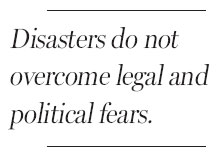Calamity fails to unify
Updated: 2013-06-02 08:01
(The New York Times)
|
|||||||

The garment factory collapse in Bangladesh that killed more than 1,100 people is one of those events that seems to unite workers, governments and companies to work to prevent the next disaster.
Major European retailers like Carrefour, H&M and Marks & Spencer have agreed to a plan to improve safety in garment factories in Bangladesh. But they will face a competitive disadvantage from American retail giants like Gap and Wal-Mart, which have declined to participate, citing fears of legal liabilities.
Some say those fears are overblown, and reflect the obsession with legal liability in the United States to the detriment of workers whose lives are at risk.
"If these American retailers get 20 lawyers in a room, they start hyperventilating about lawsuits and they'll have a communal anxiety attack," Philip J. Jennings of Uni Global Union, which represents 20 million workers, told The Times. Labor advocates argue that retailers should have embraced a worker safety plan sooner, particularly since a fire in a Bangladesh sweater factory killed 21 workers in 2010.
"This was exactly the right thing to do three years ago - but they didn't do it," Ineke Zeldenrust, a coordinator for the Clean Clothes Campaign, which opposes sweatshops, told The Times.
And companies are reluctant to spend the money to make factories safer even though "the expense would be just a fraction of the $18 billion worth of apparel exported annually by Bangladesh," The Times reported.

A fight to protect workers in New York centered on a law that required more private companies to offer paid sick time to their employees. Though the measure was aimed at providing a safety net for the city's most vulnerable workers, mostly immigrants working as cleaners and restaurant workers, City Council Speaker Christine C. Quinn blocked a vote for three years, The Times reported. Ms. Quinn had argued that "the economy is too fragile to impose any new costs on small businesses."
Ms. Quinn, who is running for mayor, is working aggressively to strengthen her ties to the business community. She finally reached a compromise with the bill's supporters after "the steady drumbeat of news conferences calling on her to permit a vote, and emotional appeals from unions, elected officials, and activists," The Times reported.
Weak safety regulations are not just the province of developing nations like Bangladesh. An aversion to regulatory power in Texas contributed to a massive explosion at a fertilizer factory in the small city of West. Fourteen people were killed, 200 were injured, and the blast leveled much of the town. It put a new focus on the hazards posed by the state's industrial sector since it has a dismal record of workplace fatalities.
But the response was mixed.
"The laissez-faire attitude about government oversight and government regulation has to have some impact on safety measures," State Senator Rodney Ellis, a Democrat, told The Times.
Other officials, like Tommy Muska, the mayor of West, told The Times that tougher zoning or fire safety rules would not have saved his town.
Governor Rick Perry, too, insists no additional regulations are needed. Texans, he said, "clearly send the message of their comfort with the amount of oversight."
NADIA TAHA
(China Daily 06/02/2013 page9)